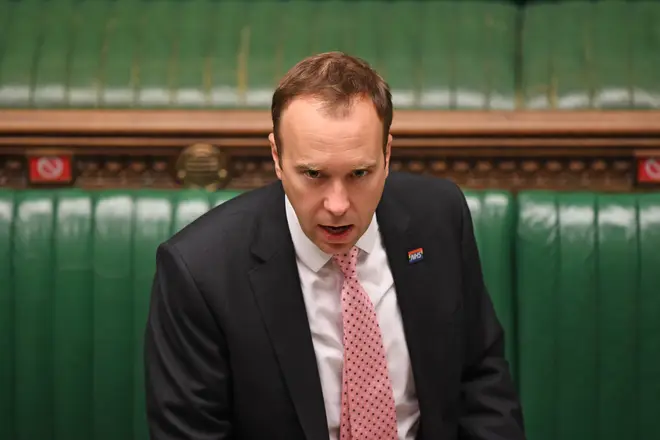
Richard Spurr 1am - 4am
8 October 2020, 18:23 | Updated: 8 October 2020, 18:27

The nation has reached a "perilous moment" in the coronavirus pandemic, the Health Secretary has warned.
Matt Hancock said he was "very worried" about local spikes in cases, telling health leaders that the situation was becoming "very serious" as hospital admissions rise.
The Health Secretary said that the Government strategy was simple, to "suppress the virus - supporting the economy, education and the NHS - until a vaccine can make us safe".
Read more: UK coronavirus cases jump by 17,540 - 3,400 more than yesterday
Read more: 10 million people in northern England face tougher lockdown from Monday
But he also said things may have been done differently during the first wave of the pandemic had more been known about asymptomatic transmission of the virus when people have the virus but are not showing symptoms.
Public Health England (PHE) also said it was "very concerned" about a rise in cases and hospital admissions.

Nick Ferrari confronts Robert Jenrick over evidence for 10pm curfew
New figures show that there were 3,044 Covid-19 patients in hospital in England as of Thursday, up from 1,995 a week ago, while 368 Covid-19 hospital patients were in ventilation beds, up from 285 a week ago.
Mr Hancock's comments came as the UK's daily coronavirus case tally rose by 17,540 - 3,400 more than yesterday's figure.
NHS Test and Trace also saw its worst week on record for the proportion of contacts it manages to trace, with more than 30 per cent of close contacts not being reached.
In his conference speech to health leaders, Mr Hancock said: "We are at a perilous moment in the course of this pandemic.
"I am very worried about the growth in the number of cases, especially in the North West and the North East of England, parts of Wales, Scotland and Northern Ireland and parts of Yorkshire.
"In parts of the country the situation is again becoming very serious.
"Hospitalisations in the North West are doubling approximately every fortnight.

James O'Brien: "We don't follow guidance as we don't trust anyone"
"They have risen by 57% in just the last week alone.
"Unfortunately we're seeing hospitalisations in the over-60s rising sharply and the number of deaths from coronavirus also rising."
He added: "We know from bitter experience that the more coronavirus spreads, the harder it is to do all the other vital work of the NHS too."
"The message to the public must be that we all have a part to play to control this virus.
"Our strategy is simple, suppress the virus, supporting the economy, education and the NHS until a vaccine can make us safe."
When asked about what he had learned from the first wave of cases and what he would do differently, Mr Hancock said: "We have learned a huge amount, we have learned about the epidemiology, we have learned about the asymptomatic transmission of the virus, which I think is probably the single most important practical fact we have learned, which means you have to assume people have the virus because they can pass it on without even knowing they have got it."
Listen & subscribe: Global Player | Apple Podcasts | Google Podcasts | Spotify
He added: "We would do things differently had we known about asymptomatic transmission, that does lead to a whole series of different policy consequences."
Mr Hancock said that the goal to reach 500,000 tests a day would be reached by the end of the month.
Meanwhile he praised NHS staff as the "linchpin" of the national effort.
"My message to everyone in the NHS is that we can and we will get through this.
"Sadly, there will be more difficult times ahead but we will get through this together."
He added: "During the greatest public health crisis in a generation you have been the linchpin of our national effort."
Mr Hancock also announced a new research project to understand the impact of the pandemic on the health and wellbeing of staff, with a particular focus on people of black, Asian and minority ethnic backgrounds.
This would identify the staff most at risk and most in need of support across England, he said.
NHS Providers chief executive Chris Hopson, said: "As we head into winter with Covid-19 cases rising, trust leaders are really worried about the impact of staff burnout.
"So it was good to hear Matt Hancock emphasise the importance of investing in staff health and wellbeing.
"We welcome the new research project to understand and address the impact of the pandemic on NHS staff.
"It is absolutely right that this will place a particular focus on how it has affected Black, Asian and minority ethnic colleagues."
It comes after Downing Street set out the figures showing why action had already been taken in the North East and North West.
In the North East, hospital admissions are up by 35% from 65 to 88 in the seven days to October 1, in comparison to a peak of 507 on April 1.
There were 69 patients on ventilators on October 1 compared to 43 on September 24, and a peak of 302 on April 11.
In the North West, admissions are up 60% from 80 to 128 in the seven days to October 1, compared to a peak of 477 on April 9.
There were 89 patients on ventilators on October 4, compared to 60 on September 24 and a peak of 350 on April 18.